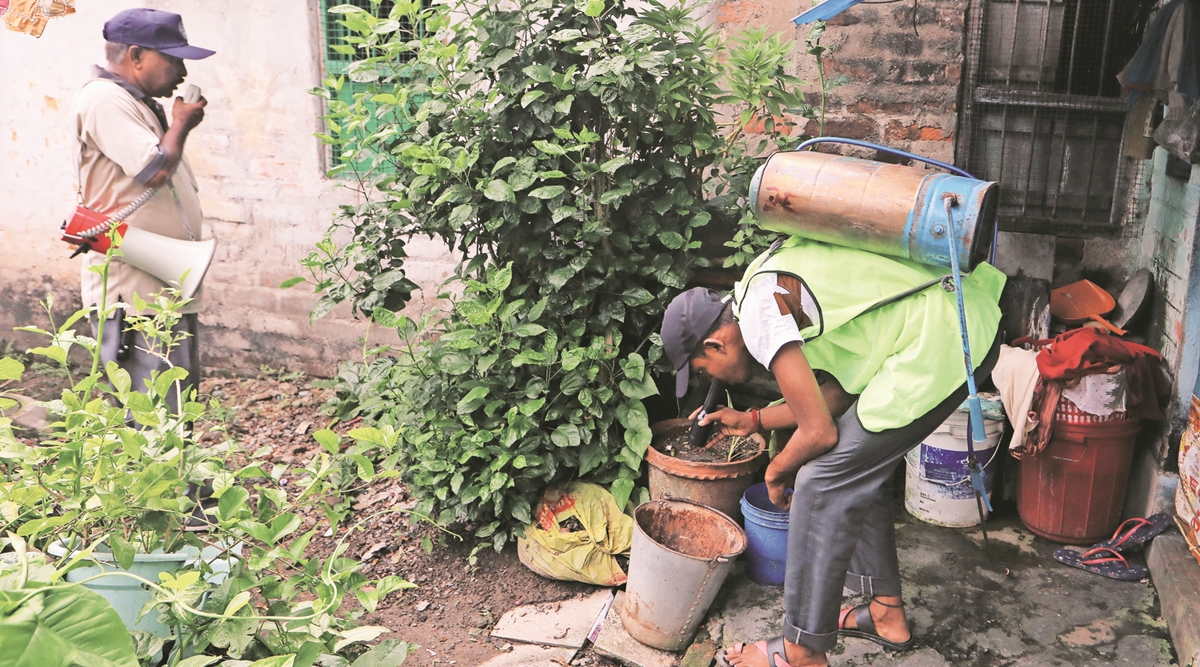 During a dengue awareness drive in Kolkata. (Express photo by Partha Paul )
During a dengue awareness drive in Kolkata. (Express photo by Partha Paul )The elderly Gangulys from south Kolkata’s Haridevpur locality escaped the coronavirus for more than two years even as they were more vulnerable to the infection since their son worked in a hospital. But little did they know that dengue would prove to be more dangerous to them than the global pandemic.
Krishna Ganguly, 56, was one of at least 16 people in West Bengal who have succumbed to dengue virus this year. She died of acute respiratory distress syndrome on September 11.
“Don’t take it (dengue) lightly. One mosquito bite can cost you life. We did not feel so this scared of Covid even,” her husband Chandan Kumar Ganguly, 62, says.
Though the health department has not yet divulged the exact number fatalities due to dengue in the state, some officials requesting anonymity pegged the figure at more than 10.

And what is even more alarming is the fact that the dengue cases so far in the state have crossed the 15,000 mark.
According to the data, the state recorded as many as 1,854 cases in just a week ending September 10, a manifold jump against the previous week. During this period, North 24 Parganas district witnessed the highest number of cases at 618, followed by Howrah (491), Hooghly (356), Murshidabad (290), Kolkata (263) and Jalpaiguri (214).
Of late, Kolkata, North 24 Parganas, Howrah, Hooghly, Murshidabad and Darjeeling are reporting relatively more cases, say officials.
In Kolkata, the worst-affected areas are Bhowanipore, Chetla, Kalighat, Alipore, New Alipore, Tollygunge, Anwar Shah Road, Jodhpur Park, Golf Green, Dhakuria, Jadavpur, Garia, Baghajatin and the neighbourhoods located off EM Bypass.
Less than a week before Krishna Ganguly’s death, a resident of Ward 115 in Kolkata also died of dengue. During this period, more than 70 people were diagnosed with the infection in the city’s Kudghat neighbourhood. The Ganguly couple’s son Kaushik (30) was among those infected with dengue, but he recovered.
In the wake of the spike in dengue cases, the health department has reserved hospital beds for dengue patients like they did in case of Covid-19. For instance, 130 general beds and 22 CCU (critical care unit) beds each have been earmarked for dengue patients at the Infectious Diseases and Beliaghata General Hospital and MR Bangur Hospital in Kolkata. Also, 20 general beds and 5 CCU beds for children have been earmarked at the city’s Dr BC Roy Hospital.
Besides, four dengue observer teams have been visiting government and private hospitals in Kolkata and surrounding dengue-prone districts. One of the teams is visiting hospitals in some north Bengal districts.
All the medical colleges have been directed to open separate fever clinics to reduce the waiting time at out-patient departments (OPDs) of government hospitals. Leaves of all state and civic health employees have been cancelled, it is learnt.
In a circular issued on September 16, the Health Department instructed all medical college and hospitals, district hospitals, sub-divisional hospitals, super-speciality hospitals and state general hospitals to set up separate fever clinics to reduce the waiting time at OPDs and encourage those having fever to undergo dengue and malaria tests.
Recently, the Health Department in an online meeting with private hospitals and laboratories appealed to them charge rationally for tests of dengue or malaria.
Active monitoring is being done by the Department of Panchayats and Rural Development in rural areas of the state. Two community medicine specialists have been deployed by the Health Department in every block to help the Department of Panchayats and Rural Development’s public health cell.
A senior doctor at a government-run hospital in Kolkata said, “The dengue virus stays in an infected person’s body for 7-8 days after which it dies automatically. Recent rains contributed to the increase in the number of cases. Regular fogging should be done by government agencies in all neighbourhoods. Civic workers should ensure the cities are garbage free and there are no mosquito-breeding sites. Also, it is every individual’s responsibility to check that their surroundings are clean.”
Kolkata Mayor and state Municipal Affairs Minister Firhad Hakim recently said during an interaction with mediapersons, “We had launched a preventive drive against the vector-borne disease. The fight against dengue requires the participation of one and all. There are several locked houses that are not under maintenance. We are cleaning such properties that are coming to our notice.”
Director (Health Services) Dr Siddhartha Neogi said, “Some hospitals in Kolkata, North 24 Parganas, Howrah, Hooghly, Murshidabad, South 24 Parganas and Darjeeling districts have opened special fever clinics to fast track fever cases in OPDs. All second-tier hospitals and medical colleges and hospitals have been directed to open such clinics. Fever cases referred from urban health centres for dengue testing can now go directly to a government laboratory and givesample, bypassing the OPD queue.”
Slamming the state government over rising dengue cases, BJP leader Rahul Sinha said,
“The situation can worsen if the government doesn’t get serious. This government has the tendency to hide a situation from people. They have issued instructions to doctors to not write dengue as the cause of death in death certificates like they did with Covid-19. So many people die of dengue every year. The state government has failed to take preventive measures to tackle this disease.”
Citing Kerala’s example, CPI(M) senior leader Sujan Chakraborty said the Trinamool government should learn from the southern state the way it fought the Nipah virus. “We had also raised the dengue issue in the Assembly. While the Chief Minister says something, the health officials say something else.”